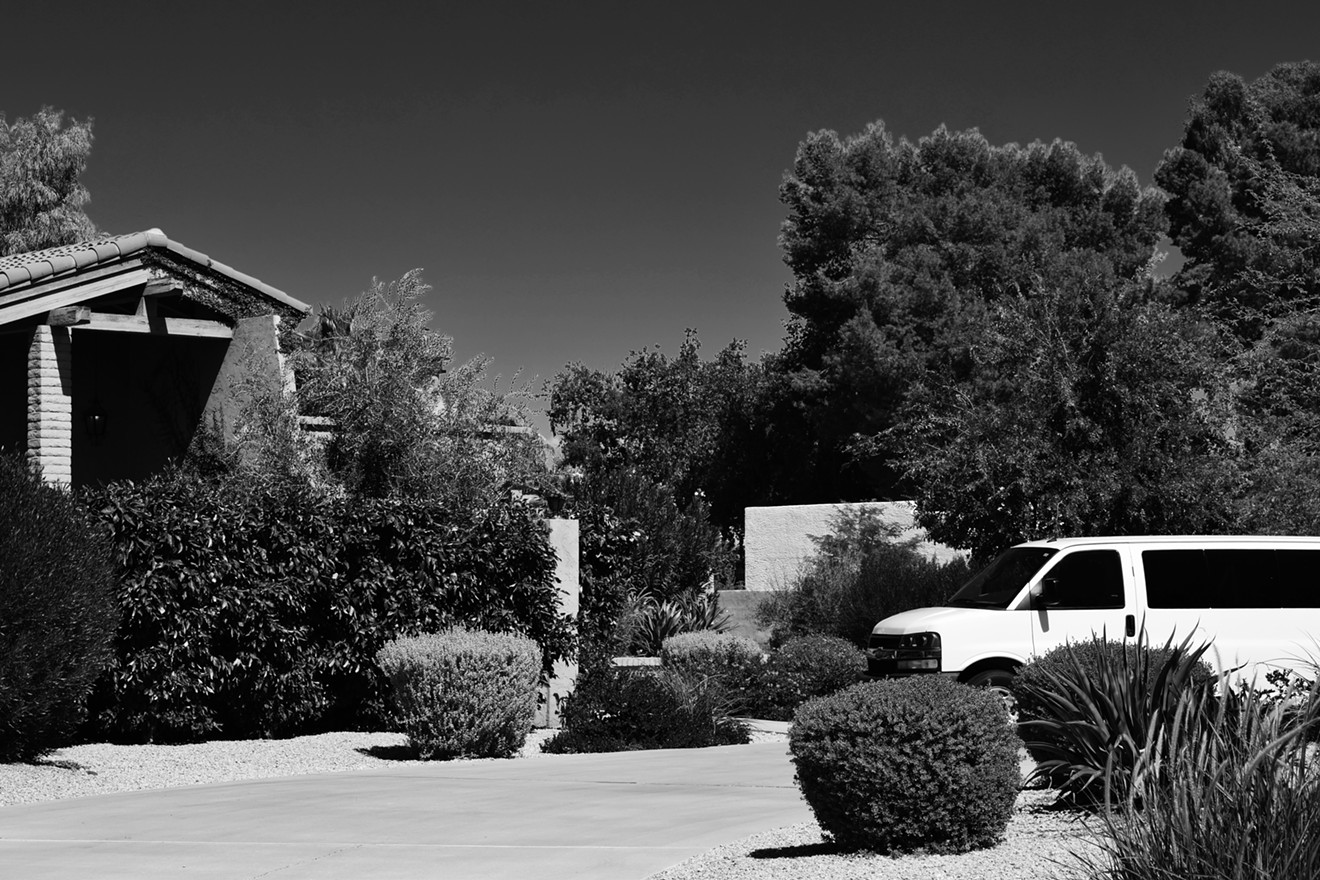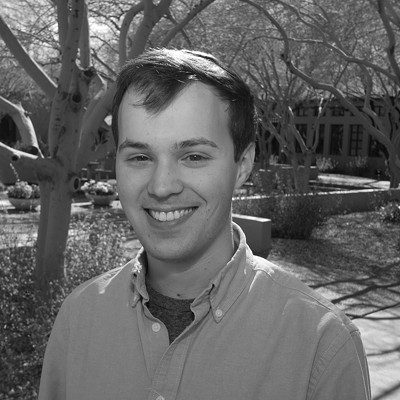The white, 12-passenger van parked out front is all that distinguishes the house on Fanfol Drive. On this street in upscale Paradise Valley, elegant single-family homes sport red-tile roofs and expansive front yards with cactuses.
And though you’d never know it when driving past, the house with the van is a sober-living facility on the front lines of a battle over residential addiction treatment.
The town government has zeroed in on this sober-living facility and its proprietor, a Scottsdale-based addiction treatment center called Pinnacle Peak Recovery. Paradise Valley says the sober home violates zoning regulations with its 11 occupants.
Neighbors aren’t shy about their complaints:
• The van driver with a lead foot who constantly ferries many residents between the house and a treatment center.
• The co-owner with a criminal record.
• The house manager who posts misogynist memes on social media.
• The residents in recovery who might bring to the neighborhood connections from a past life of substance abuse.
“This is a business that’s being run out of a home,” said Sande Simon, 72, who lives down the block. “It has devalued my home at least $10,000. Think about it, would you buy a house next door to me? You’re not going to buy my house — not when there’s a sober-living facility.”
Federal law requires communities to accommodate sober-living homes for people recovering from addiction. Yet as residential facilities have proliferated in recent years, especially in Arizona, communities have sought greater oversight. Pinnacle Peak's facility is among the first of its kind to move to Paradise Valley, a wealthy community of million-dollar homes with a median household income that exceeds $150,000, according to the U.S. Census Bureau.
On September 7, the town of Paradise Valley filed a complaint against Pinnacle Peak, alleging that the house violates a zoning ordinance because there are more than five unrelated people living there.
The town also argues that Pinnacle Peak and property owner Sanja Mosher lack the proper tax licenses to operate a business and lease the property, respectively.
Mosher and her husband were abroad last week, but Dan Mosher told Phoenix New Times that they are committed to complying with all Paradise Valley regulations and paperwork. He also pledged to give find solutions for neighborhood complaints, which were only recently brought to the couple's attention.
However, if Pinnacle Peak "cannot resolve their various issues with the city of [Paradise Valley] and the neighborhood, their tenancy will unfortunately need to be terminated," Mosher said in a message.
Paradise Valley Town Council member Julie Pace has heard concerns from many residents on the block. But she's also had to inform them that under federal housing nondiscrimination law, municipal governments can’t simply ban sober-living homes.
Nevertheless, there is a give-and-take on both sides, Pace explained. Because sleepy Paradise Valley is predominately residential, sober-living facilities that wants to fit in will have to engage with neighbors.
“Those operators that are transparent and run a high-quality operation are the best ones to fit into these low-density neighborhoods,” Pace told New Times. “If they’re running party houses and taking over a neighborhood, that’s probably going to be full of complaints from neighbors that the town has to investigate and take action on.”
Because the Affordable Care Act required insurance companies to cover addiction treatment, the number of these treatment centers has increased in warm-weather climes, including Arizona, Florida, and California.
Prescott, in particular, has seen a significant increase in sober-living homes, which are by and large unregulated. Ideally, these houses offer a supportive residential environment for individuals recovering from substance abuse. Most homes are tied to an off-site treatment center — Pinnacle Peak, for instance, drives residents from their house on Fanfol Drive to an off-site center to get treatment.
But some bad actors have taken advantage of a pool of health insurance money. Several investigations have exposed sober-living centers that bilk vulnerable people out of their dollars and, quite literally, kick them to the curb when the insurance funds dry up, or when patients are discharged for dubious reasons.
Legislators have stepped in. In 2016, the Arizona Legislature passed a measure that granted communities more oversight of sober living facilities. Under the law, counties and cities can requests documents that show a property’s owner or leaseholder. They can also review supervision and rehabilitation regimens.
In the case of Pinnacle Peak Recovery, the personal history of the co-owner has not gone unnoticed. Twenty-nine-year-old Tyler Tisdale was convicted for an attempt to defraud banks in 2012 during his struggle with opioid addiction.
According to a statement by the arresting officer, Tisdale presented a credit card to a clerk at a Chase Bank in Goodyear and asked for $5,000 in cash. That clerk, however, had been warned by another branch in Buckeye — it had just been a victim of Tisdale’s scam, after his credit card turned out to be fraudulent.
After the Goodyear bank called the police, Tisdale was arrested, telling the officer it was “a scheme that a guy he buys drugs from had come up with.” The plan had been for Tisdale to fly from his home in California to Arizona, where he would withdraw cash using a phony credit card provided to him. Tisdale pleaded guilty to attempted theft, a felony, and was sentenced to two years' probation.
“I suffered from an opioid addiction for several years which led to some bad decisions,” Tisdale wrote in an email to New Times. “Today, I have over 5 years of continuous sobriety thanks to programs like Pinnacle Peak Recovery. I am deeply humbled and grateful that I am able to give back and help others in their recovery on a daily basis.”
But Tisdale's felony conviction has “caused the neighborhood to be uneasy,” said a neighbor, who asked to remain anonymous.
“There are two or three young married couples in the neighborhood, with young children, and I know I wouldn’t want to be there like that,” she said.
A house manager, Christopher Urias, has also attracted attention. A Facebook page that appears to belong to Urias posts misogynistic memes on a near-daily basis. It also publicly lists his job as a Pinnacle Peak house manager supervisor.
A manager at the sober-living home identified himself as Chris to New Times last week, but directed all questions to the Pinnacle Peak management. The company's executive director did not respond to requests for comment.
An attorney representing Pinnacle Peak, Amie Mendoza, said that the company planned to file a new request for reasonable accommodation. On August 29, the town denied a previous request that Pinnacle Peak be allowed to make use of the home's maximum 14-person occupancy — the company had submitted an out-of-date form.
Red tape aside, Mendoza said that misconceptions can lead to a harsh neighborhood spotlight on residential recovery centers.
“It’s really difficult, at the end of the day, to get beyond the biases and discrimination that’s happening,” she said.
Mendoza explained that people recovering from addiction are protected from housing discrimination under the 1968 Fair Housing Act and the Americans with Disabilities Act. She also said that Arizonans often contradict themselves — the state is battling an opioid epidemic, yet neighborhoods take a not-in-my-backyard attitude toward prospective sober-living homes.
“We can’t on the one hand say we have a crisis with a drug addiction problem and, on the other hand, say that they can’t live in our neighborhood,” Mendoza said.
According to Anthony Pfeffer, an executive committee member of the Arizona Recovery Housing Association, a high number of residents in a sober-living facility gives him pause, depending on the size of the house. However, he said that well-run and licensed residential sober-living homes serve a crucial purpose.
"Good sober living homes are something that’s needed in the community – the good ones," he emphasized. "Otherwise, they’re going to be homeless. They have nowhere to go and no one to help them get their life back together."
Pinnacle Peak is not a member of Pfeffer's Arizona association, but it is recognized by the Joint Commission, a behavioral and mental health accreditor.
For the residents at the sober-living home, it's unclear how much they know about the drama happening outside their walls.
On Thursday around noon, the only activity on Fanfol Drive was at the driveway of the sober-living home, where a couple of people waited by the open door of the van, evidently preparing to depart.
When asked about neighborhood complaints, a resident in the driveway seemed confused. “The van’s driving too much?” he said. “Dude, we have to go to the center, come back, leave for meds, come back.”
“What, are they trying to get rid of this house?” he asked.
[
{
"name": "Air - MediumRectangle - Inline Content - Mobile Display Size",
"component": "18478561",
"insertPoint": "2",
"requiredCountToDisplay": "2"
},{
"name": "Editor Picks",
"component": "16759093",
"insertPoint": "4",
"requiredCountToDisplay": "1"
},{
"name": "Inline Links",
"component": "17980324",
"insertPoint": "8th",
"startingPoint": 8,
"requiredCountToDisplay": "7",
"maxInsertions": 25
},{
"name": "Air - MediumRectangle - Combo - Inline Content",
"component": "16759092",
"insertPoint": "8th",
"startingPoint": 8,
"requiredCountToDisplay": "7",
"maxInsertions": 25
},{
"name": "Inline Links",
"component": "17980324",
"insertPoint": "8th",
"startingPoint": 12,
"requiredCountToDisplay": "11",
"maxInsertions": 24
},{
"name": "Air - Leaderboard Tower - Combo - Inline Content",
"component": "16759094",
"insertPoint": "8th",
"startingPoint": 12,
"requiredCountToDisplay": "11",
"maxInsertions": 24
}
]












